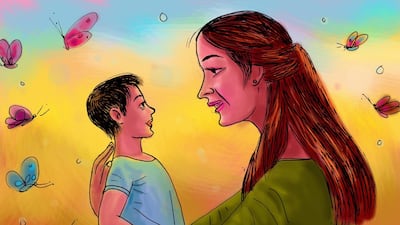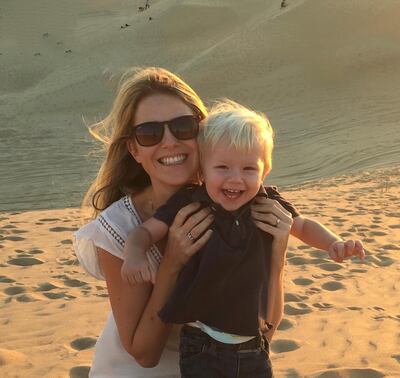Three years ago, my toddler son was diagnosed with cancer. The diagnosis was sudden and utterly shattering. There had been no hints of sickness; we had all holidayed in Sri Lanka only five weeks before, and Arthur seemed in robust health, gorging on pizza and jumping over waves with his older brother.
Then the doctors warned us that he was close to death; the only visible symptom was a hardness in his tummy, which our GP had originally put down to constipation. We listened, numb with shock, as the medics gently explained that our boy had Burkitt’s lymphoma, a rare cancer that grows so fast, it can kill in six weeks. Initially we were in angry denial, but the CT scan was non-negotiable. Arthur’s body was making millions of unnecessary lymphocytes (a type of white blood cell), and the tumour was doubling in size every 18 hours.
We called our families. We booked flights. We functioned, although every now and then the enormity would hit me, and I would have to hold on to something to stop my legs giving way. I started smoking because it helped with my anxiety, and as far as I could see, the worst had already happened.
Twenty-four hours later, Arthur and I left Dubai, bound for Great Ormond Street Hospital in London. As we left our home, my husband and I acknowledged that we might never be together again as a family of four. It all happened so fast. I walked out of my life in Dubai with no notice, only a couple of phone calls to my closest friends and my boss, to say I might never be back. I left my home, my husband and my eldest son behind.
Time was against us; the doctors warned us that without treatment Arthur would die in days. This all took place in 2017, but as the Covid-19 pandemic spreads inexorably across the world, the similarities of what we are all going through now are striking: the suddenness; the uncertainty; the fear; the loss of freedom; the directionless anger; the yearning for the old life you once took for granted.
You might not have started smoking, but I bet you are secretly scoffing chocolate or cheese, because who cares about a few extra pounds when millions of people are contracting an incurable virus? There is the feeling of collective shock that life can change so absolutely, so quickly.
Imagine yourself two months ago; blithely brushing past strangers, kissing friends, sharing anecdotes at restaurants and bars. Now everyone is lonely, and desperate for a sign that life might return to normal. Working from home, homeschooling, virtual socialising – our worlds have shrunk to the perimeters of our properties.
Arthur and I lived in an isolation room in the Butterfly Ward in Great Ormond Street Hospital for nearly five months. His treatment involved four debilitating rounds of chemotherapy, which weakened his immune system. A simple virus such as the common cold or chickenpox could have killed him, so we were often quarantined, and any visitors had to wear surgical masks and gloves. Our hands were sore from repeated washing, and a trip out to the park or the supermarket felt like such a treat.
The prognosis was good; a 94 per cent chance of cure, but that 6 per cent still haunted me in the middle of the night, when I woke up worrying about our future.
It feels the same now; we are all struggling with the uncertainty and the loss of autonomy. How long will we have to stay in? How many people will we lose? Will I still have a job at the end of it? Will it ever be over?
I used to feel horribly angry; I would step outside for a clandestine cigarette and watch people pick up coffee, all of them oblivious to their glorious freedom to carry on with life. We feel the same now when we see people loitering on their way to the supermarket or going for an illicit jog.
On my worst days, I waited for nightfall and dreaded dawn, because it brought with it another 12 hours of persuading Arthur to succumb to being prodded and pricked. On better days, I planned educational activities and distracted him by decorating our room with rainbows. Lockdown now feels similar, complete with homeschooling and moody motivation slumps.
At least with Covid-19, we are all in it together and we can share the reassurance of the collective experience. At times, this sense of community is fiercely uplifting, like when Dubai Marina and other parts of the city echo with applause, as citizens cheer for the country’s healthcare workers.
We will come out the other side of this pandemic, life will eventually return to normal. Arthur is now a healthy five-year-old, and we moved back to Dubai two years ago.
In the end, treatment lasted 10 months, not five, but we picked up exactly where we left off and my boss even kept my job open, evidence that people can be incredibly kind in times of hardship.
Could I imagine a time after cancer and quarantine while we were living through it? No, absolutely not, and while Arthur has emerged unscathed, with no real memories of those monotonous days and nights, I remember exactly how it feels.
We walked out of hospital into the sunshine of a spring afternoon in England, and I bought Arthur a glow-in-the-dark toothbrush to celebrate. In that moment, I found it hard to process that it was truly over.
But eventually, freedom tastes every bit as brilliant as you hope. The sun shines brighter, the breeze feels fresher. Your life froths with possibility and choice. Meeting friends for a drink feels like a privilege. Going back to the office feels deliciously normal. Travel feels glamorous again.
We will be the people who lived through Covid-19 and survived. Think of the collective bonds we will have created, the community we will have built. The post-pandemic parties will be wild, artists will be inspired, musicians will be moved, and filmmakers will have to come up with new worst-case scenarios for their end-of-the-world movies.
We will find joy in each other, in the simple acts of gathering and greeting without fear of contagion. We will hug our parents tighter, and sigh with relief as our children restart school. We will be grateful for our lives.



